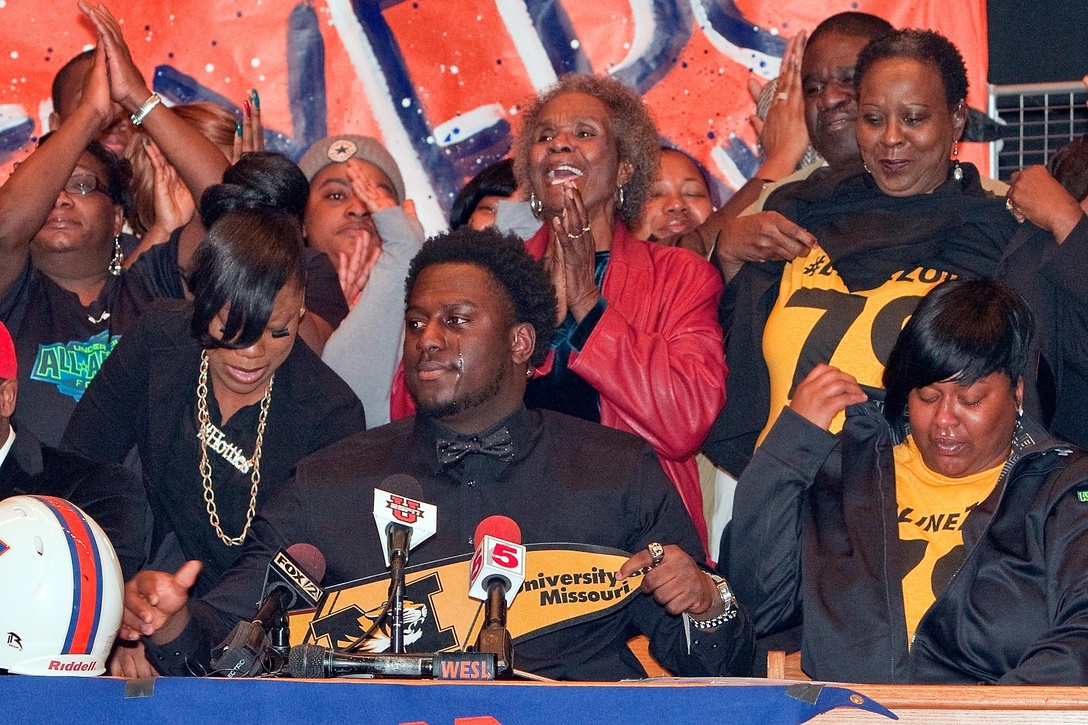
As much praise as Gary Pinkel has received for reviving the Missouri program, the next Mizzou coach will need to show improvement.
Especially in one area: recruiting.
Pinkel and his staff, especially former defensive coordinator Dave Steckel and line coach Craig Kuligowski, made a science of developing underrated prospects into stars.
The results were amazing. Since 2007, Mizzou has won four division titles — two in the Big 12 and two in the SEC — and tied for another in the Big 12.
That’s division titles — in the weaker of two divisions.
Missouri has been good. But with a championship on the line, the Tigers weren’t able to stand up to Alabama, Auburn or Oklahoma.
In each of the four conference championship games they played, the Tigers were beaten decisively. Twice, they were blown out before the fourth quarter.
To win consistently — Mizzou has also finished at the bottom of the East twice — the Tigers must recruit more talented athletes.
Despite his team’s achievements, Pinkel never was able to recruit many of the nation’s elite prospects.
Pinkel’s best recruiting class may have been his 2015 class, which included five-star DL Terry Beckner Jr. and four-star QB Drew Lock.
Most of his recruiting classes ranked between 25th and 35th by the so-called recruiting “gurus” and were filled with “three-star” prospects, not the four- and five-star players that dominate rosters at Alabama, Auburn, LSU, Tennessee, LSU, Georgia, Florida, Texas A&M and Ole Miss.
And yes, Pinkel recruited two-stars such as NFL players Sean Witherspoon and Andrew Gochkar, as well as SEC Defensive Player of the Year Michael Sam.
The new coach will need to follow in Pinkel’s footsteps in recruiting his home state with better results. Missouri usually produces about 15 solid BCS prospects with only a few elite players who attract the attention of national powers. Under Pinkel, the Tigers relied heavily on homegrown players.
Pinkel’s staff did well in rural parts of the state, locking down offensive linemen and defensive players. They got five-star WR Dorial Green-Beckham from Springfield.
Mizzou was solid in recruiting the Kansas City area, the stomping grounds of quarterbacks coach Andy Hill, a popular former player from western Missouri.
In the St. Louis area, Mizzou got stars such as Jeremy Maclin, Sheldon Richardson and now Terry Beckner Jr. But they also lost several top recruits, including RBs Montee Ball and Ezekiel Elliott.
Pinkel has the Tigers’ recruiting strategy in transition. Recruiting Texas, a specialty in the Big 12 days, was reduced in favor of going into SEC territory in Georgia, Tennessee and Florida. So far, the new territory hasn’t produced better results.
Though Mizzou signed Lock last February, the Tigers lost the other two four-star recruits in the state, TE Hale Hentges to Alabama, and WR Alex Ofodile to Oregon.
Now, the new coach must battle the fallout from the national media coverage of racial tensions on campus and a disappointing season with a demoralizing offense.
It’s not an easy sell with Alabama and Oregon in the neighborhood.
Mizzou hopes a new football complex in the end zone will aid in recruiting. Clemson and Kentucky are among teams that have opened similar facilities in the last few years.
Pinkel sold the idea to former athletic director Mike Alden last year.
“(Pinkel) was saying, ‘Where am I going to get the biggest bang for recruiting? Where is the biggest wow factor for recruiting?’” Alden told the Kansas City Star. “He believes, and I agree with him on this, you’re going to get a bigger ‘wow’ factor with an end-zone complex and what we’re trying to do there than you would for a new indoor facility.”
So what should the new coach’s recruiting strategy include?
- Retain Hill, who has important contacts throughout the state, and make an effort to keep in-state talent.
- Hire some top-notch recruiters with experience getting players in Texas, Florida and Georgia.
- Amp up the efforts in Texas, which Texas A&M made SEC territory.
- Use the new football complex as a showpiece to recruits.
Mizzou doesn’t have the fanatical statewide following enjoyed by Alabama, LSU, Tennessee and Georgia. Pro teams in St. Louis and Kansas City cut into that potential. Mizzou doesn’t have the same record of success, either. Nor does it have the same financial resources.
But Mizzou has a solid football program that’s won two division titles in four years in the SEC and produced more than its share of NFL players. It’s getting a new football-only complex.
Pinkel managed to win with less raw talent than his competitors. But that’s a risky path to follow.
The way to win consistently — and capture a conference championship — is to recruit the best players.







